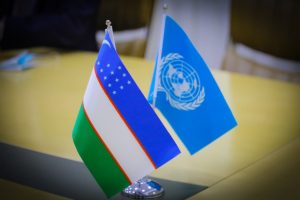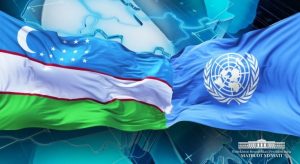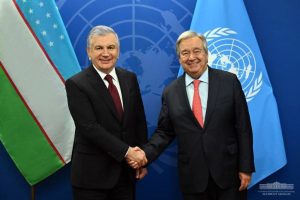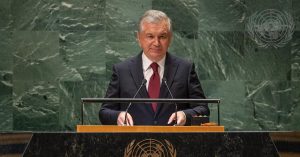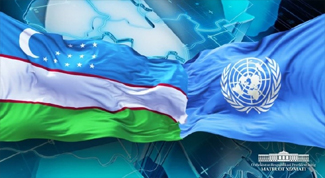
New initiatives of Uzbekistan at the UN General Assembly
On 17-20 September the President of the Republic of Uzbekistan Shavkat Mirziyoyev took part in the events of the 78th session of the UN General Assembly. During which made a report at the general debate of the plenary session of the General Assembly, where he presented his vision on current issues of the regional and global agenda.
Initiatives of Uzbekistan at the UN
The President of Uzbekistan announced his intention to continue “the policy of building a New Uzbekistan as a legal, secular, democratic and social state.” He also emphasized that “as a result of ongoing consistent reforms, the economy of Uzbekistan, despite global challenges, is demonstrating stable growth rates. Over the past six years, the volume of gross domestic product has increased by more than one and a half times. Our main goal is to double this figure by 2030”.
It is worth noting here that one of the main goals of the Uzbekistan 2030 Strategy is “to ensure sustainable economic growth so that people are satisfied with life.” The main benchmark for this goal is Uzbekistan’s inclusion in the list of upper-middle-income countries with an increase in GDP per capita from the current $2,200 to $4,000. And given the very dynamic demographic growth of the population of Uzbekistan, this means that the economy should grow significantly by 2030 (in 2022, Uzbekistan’s GDP exceeded $80 billion for the first time).
About joining the WTO
“Another priority task for us on the path to liberalizing our economy is to become a full member of the World Trade Organization (WTO) in the near future,” the President said in his speech. Due to the limited capacity of the domestic market due to the insufficient purchasing power of the population, systemic changes in the economy aimed at increasing the role and importance of the private sector will clearly not be enough to ensure the necessary rates of economic growth required to achieve a decent standard of living. To achieve this, export potential should also be increased in every possible way.
The Uzbekistan 2030 strategy provides for the expansion of export opportunities, bringing exports to $45 billion, which is more than twice the level of exports achieved in 2022 of $19 billion. For this purpose, it is planned to create an Industrial Development Fund, which will provide support to enterprises producing products competitive in foreign markets with high added value.
WTO accession will be important from the point of view of expanding export opportunities, as this will help reduce barriers to entry of Uzbek products into the markets of most countries of the world.
About social support
Speaking in his speech about Uzbekistan’s achievements in this direction, the President noted that “thanks to policies aimed at improving the standard of living of the population, since 2017 the poverty level in the country has halved. By 2030 we plan to reduce it to 7 percent.” He also supported the initiative of the United Nations Secretary-General “Global Accelerator for Job Creation and Social Protection” and proposed, within its framework, to hold the World Conference “Social Protection: The Path to Sustainable Development” in Uzbekistan in 2024 under the auspices of the UN.
Human Capital Development
In his speech at the UN General Assembly, President Shavkat Mirziyoyev especially emphasized that “The development of human capital and the education of a creative young generation is one of the strategic tasks that Uzbekistan has set for itself.” He noted that in recent years a radical transformation of the education system has been carried out in Uzbekistan. Over the past six years, enrollment in preschool education has increased from 21 to 70 percent, and in higher education from 9 to 38 percent. “By 2030, opportunities will be created for every child to attend kindergarten, and every second school graduate to study at a university,” the President said.
About Central Asia
Central Asia is a priority direction of Uzbekistan’s foreign policy. Speaking at the session of the UN General Assembly on cooperation in Central Asia, President Shavkat Mirziyoyev emphasized: “Thanks to our joint efforts, Uzbekistan and all neighboring countries managed to solve many problems related to state borders, transport corridors and water use. Mutual trade between the countries of the region has grown two and a half times, and the number of joint ventures has increased five times.”
Thanks to the implementation of mutually agreed policies, the countries of the region are becoming more attractive both for foreign investors and tourists, and in terms of the reliability of transport corridors, which is very important in modern conditions of transport and logistics instability. This gave grounds for the President of Uzbekistan to state at the session that “our region is becoming a center of economic development, a transport and communication bridge connecting East and West, North and South. And interest in him is growing.” “I am confident that with the support of the international community, Central Asia will continue to follow the path of consolidation,” said the head of our state.
In his speech, the President also pointed out that almost half of the population of Central Asia is young people, and issues related to them are of particular importance for the region. In this regard, it was proposed to create a Working Group at the UN to promote the development of youth in Central Asia, within the framework of which it would be advisable to develop the “Central Asia Youth Agenda – 2030” program.
About climate change and ecology
Speaking about the difficult environmental situation in the world, Shavkat Mirziyoyev said that “Central Asia, which continues to fight the tragedy of the Aral Sea, is becoming one of the most vulnerable regions to climate change.” Thus, over the past 30 years, the air temperature in our region has increased by one and a half degrees, and about a third of the total area of glaciers has disappeared. In the next 20 years, the flow of two large rivers in the region – the Amu Darya and the Syrdarya – may decrease by 15 percent. Per capita water availability is expected to decline by 25 percent and crop yields by 40 percent.
If timely measures are not taken, the consequences of this could cause serious damage to the socio-economic stability of the region. Therefore, Uzbekistan supported the establishment of the post of Special Representative of the United Nations Secretary-General for Water Resources and advocated the involvement of the most advanced technologies in the process of creating the Platform for Water Saving Technologies in Central Asia, using the United Nations – Water Resources mechanism.
The President of Uzbekistan also proposed establishing a “Central Asian Climate Dialogue” and took the initiative to adopt a UN General Assembly resolution “Central Asia in the face of global climate threats: solidarity for common prosperity.” He proposed discussing its main provisions at the international climate forum, which will be held in Samarkand in 2024.
Thus, the new policy of Uzbekistan, which began in 2017, focuses not only on fundamental economic reforms within the country and on the integration of the economy of Uzbekistan into the world economy, but also on active participation in the international life.
Uzbekistan is actively involved in solving global and regional problems: its numerous initiatives (especially related to solving regional Central Asian problems, in particular the Aral Sea, in the field of poverty alleviation and social development, youth support) are receiving international recognition and are being successfully implemented. The socio-economic reforms carried out in Uzbekistan are also receiving international recognition, which also increases the international authority of our country.
- Flags: Uzbek UN
- Symbole
- Uzbek Pr, UN sec G
- Uzbek


